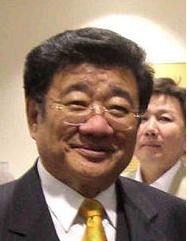
Although Ochirbat strongly advocated policies of rapid national revitalization and economic reform to break the country from its socialist past and adopt capitalism by the year 2000, he had a reputation for flexibility and willingness to compromise and his persuasiveness helped diffuse confrontations and political crises in the lead up to the first free elections in June 1993. Nevertheless, ideological splits within the MPRP lead the party leadership to reject Ochirbat as their presidential candidate and instead nominate hardliner Lodongiin Tüdev, editor in chief of the communist newspaper Ünen. Sensing an opportunity, a coalition of opposition parties, including the National Democrats and Social Democratic party, nominated Ochirbat as their candidate. On June 6, 1993, Ochirbat soundly defeated Tudev, winning 57.8 percent of the vote to become the first president ever elected by popular vote in Mongolia.
Ochirbat's term in office was beset by a series of political and economic crises. By the end of 1993, Ochirbat had become a harsh critic of government's failure to address the country's worsening economic situation. The country suffered food and energy shortages and high inflation. Ochirbat accused the government of not meeting its social welfare obligations. He was also critical of the Mongolian Intelligence services for failing to prevent the rise of transnational organized crime in Mongolia. He blamed over burdensome local and central bureaucracies for blocking faster economic improvement and called for reducing the overall size of the bureaucracy and speeding up privatization of government owned assets. By 1995 only 19.2% of economy had been privatized.
When in March 1994 opposition parties withdrew from parliament, Ochirbat publicly called for a protection of the rights of the minority parties and accused the ruling MPRP of exploiting the media to their advantage by limiting press coverage of parliament. He also supported reforms to election law to open elections to all parties in advance of parliamentary elections in 1996. In 1994, he vetoed a parliamentary decree to promote Cyrillic script in Mongolia and delay introduction of classical script.
Following his loss in a re-election campaign in 1997, Ochirbat left Mongolian politics and founded the "Ochirbat Foundation", a non-profit, non Governmental organization that focused on poverty alleviation and self-sufficiency, environmental, and education programs. In 2000 he became Director of the Center for Ecology and Sustainable Development at Mongolian University of Science and Technology. In 2005 he was appointed Member of the Constitutional Court of Mongolia and re-appointed in 2010.
 RSS Feed
RSS Feed